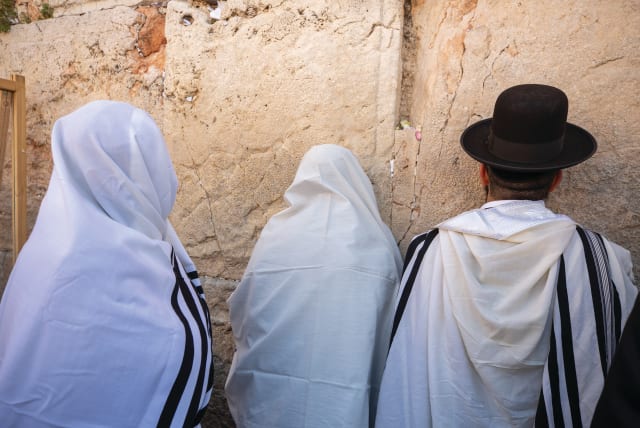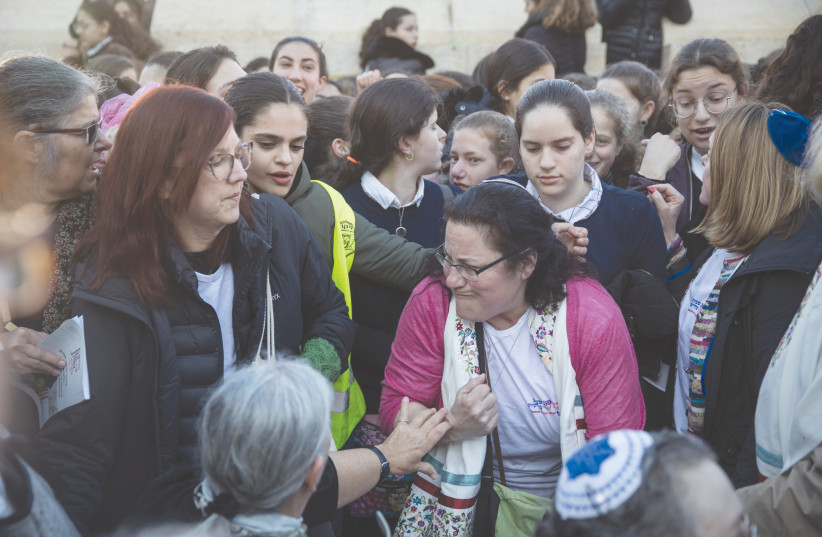Don’t cherish Jewish values? You don’t get to make the call - opinion

Liberals often completely overlook three issues that make up 'the moral matrix' – loyalty, authority and sanctity.
"Look, in the end, it’s just a piece of fabric.”
In talking to liberal groups, whether Israeli secular pre-army programs or Diaspora college students on Masa and Birthright programs, I often choose to start with a paraphrase of Jonathan Haidt’s famous social experiment.
I show the participants a tallit and ask if it would be moral for me to rip it apart and use it to wash down my house, in private. The students usually move uncomfortably in their seats and start playing mental gymnastics. They are clearly perturbed, but don’t know how to explain why. It feels wrong, but they can’t quite pass judgment.
In the end, there is always that one student, who will say it. “Look, it’s important and all, but in the end, it’s just a piece of fabric. It doesn’t have feelings. And if you do this in the privacy of your home, who are we to say that this is immoral?”
This statement is at the crux of the religion and state debate going on Israel today.
Time and time again, participants in my talks confirm Haidt’s findings that when making moral decisions, liberals ask one overarching question: “Is anyone getting hurt?” They pay some attention to two additional questions: “Is this fair?” and “Is there a freedom that is being lost?” But they will completely overlook the three other issues that make up “the moral matrix” – loyalty, authority and sanctity. Conservatives, on the other hand, will usually consider all six values and try to strike some kind of a balance between them.
For the past eight years, I have been asked time and again to speak out against “haredi violence” around the Kotel issue. I have been challenged to explain why the religious keep insisting against public transportation on Shabbat or uphold strict conversion and marriage laws. “Why can’t you just live and let live?”
And while it goes without saying that violence has absolutely no place in public discourse, it is high time that we all understand that on issues of religion and state, the stakes are drawn between people with a deep sense of reverence for Jewish tradition and those for whom the Western Wall, with all its history, is just a bunch of stones; the tallit, with all the warm and ‘fuzzies,’ is just a piece of fabric; and Shabbat, Friday dinner and all, is just another day of the week.
Two political statements from last week illustrated this point well. In a Knesset committee discussion on conversion, Yisrael Beytenu MK Yulia Malinovsky opined that “the Torah has 600 and something commandments, the Lubavitcher Rebbe reduced them to 10, and we can reduce them even further.” It is ironic that Malinovsky chose to invoke the memory of the Lubavitcher Rebbe, who staunchly opposed Israeli legislation giving Jewish status to non-halachic Jews. It is also unclear what made Malinovsky think that the Lubavitcher Rebbe had the power or the inclination to “reduce” the number of commandments. What is clear, however, is that for her the Torah is expendable, a compilation of arbitrary rules that can be done away with to fit any agenda.
The second statement came hours later from Labor MK (and former head of Israel’s Reform movement) Gilad Kariv. He suggested an automatic conversion process for children of non-Jewish mothers, whereby babies would be circumcised before leaving the hospital and automatically registered as Jews. Apparently, Kariv didn’t notice that for the past three millennia Jews have been circumcising their sons on the eighth day, while Israeli hospitals discharge moms and babies on the third. More importantly, though, Kariv has demonstrated that for him the integrity of the Jewish people, the criteria for becoming Jewish, not to mention the laws of circumcision are all arbitrary and can be changed at whim for political interests.
Unlike Malinovsky, Kariv, and their peers, six million Israeli Jews, haredi, religious, and traditional, as well as millions of our brothers and sisters in the Diaspora, don’t view our heritage as a haphazard collection of randomness.
For us, a tallit is not just a piece of cloth. It is a holy religious item, for which our grandfathers risked their lives in the barracks of Auschwitz and Bergen-Belsen. The Western Wall is not just Herod’s supporting wall. It is a holy place, which our ancestors defended with their lives. And the laws of the Torah are not capricious. They are the core of who we are, to the extent that 2,000 years later we still mark the martyrdom of Hannah and her seven children, and the self-sacrifice of the Maccabees by lighting Hanukkah candles.
And today, all over the world, millions of Jews make daily sacrifices for their Judaism. They live simpler lifestyles to devote more time to learning Torah, forego promising jobs to keep Shabbat, and skip luxuries to give their children Jewish education. As antisemitism is raising its ugly head, Jews around the world are taking risks to publicly exhibit their Jewish identity, because being a Jew is a core value and a commitment, not a status symbol that an Israeli political hack can assign at random.
And as long as we are talking about morality, it is immoral for a small group of self-interested and sneering politicians to violate the sanctity of Jewish values, cherished by millions of Jews in Israel and globally. If the story of Hanukkah has taught us anything, it is that commitment and sacrifice can make up for lack of power in spades. And for most of us, a tallit is not just a piece of fabric.
The writer serves as Israel director of Am Echad, an organization committed to strengthening the connection between Israel and Diaspora Jewry.
Jerusalem Post Store
`; document.getElementById("linkPremium").innerHTML = cont; var divWithLink = document.getElementById("premium-link"); if (divWithLink !== null && divWithLink !== 'undefined') { divWithLink.style.border = "solid 1px #cb0f3e"; divWithLink.style.textAlign = "center"; divWithLink.style.marginBottom = "15px"; divWithLink.style.marginTop = "15px"; divWithLink.style.width = "100%"; divWithLink.style.backgroundColor = "#122952"; divWithLink.style.color = "#ffffff"; divWithLink.style.lineHeight = "1.5"; } } (function (v, i) { });

